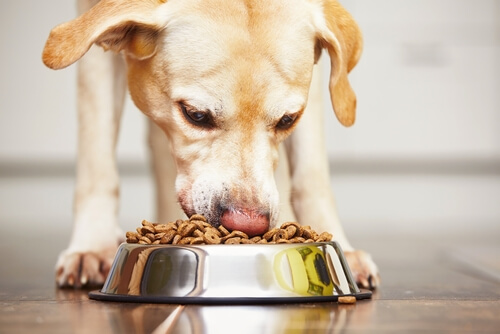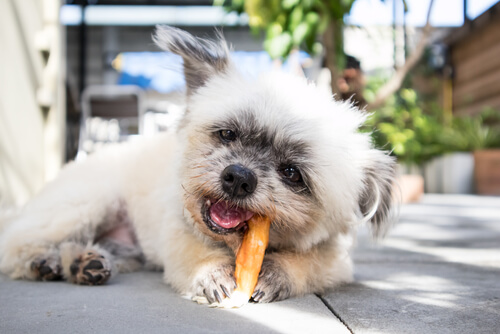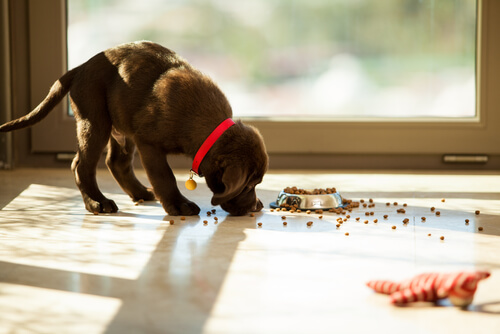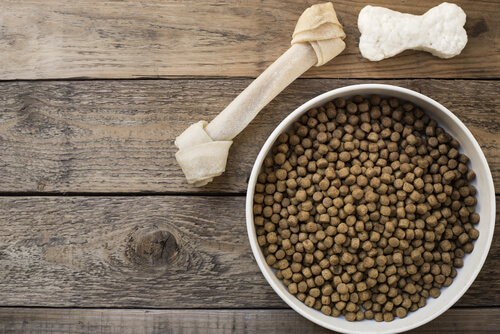Tips on How to Help Dogs That Eat Quickly

Problems That Arise When Dogs Eat Too Quickly
Eating anxiously is not good for anyone. Dogs that eat too quickly or gobble their food down without chewing it properly can suffer from digestive issues, vomiting and even serious illnesses, such as torsion of the stomach. Serving your dog a meal without knowing if it’s going to agree with their stomach, and watching a dog pace nervously around their bowl are two experiences that are far from pleasant.
On the flip side, there are cases in which dogs that are protective of their food arrive get to the point of attacking their family members or fellow animal companions. This situation affects the whole family’s levels of trust and well-being; it affects the humans in that they can not relate to their dog normally, and it affects the dog because he or she does not want to behave in that fashion with the people it loves and trusts.
There are plenty of issues related to food, but they all have solutions. We want to stress that a dog that eats too quickly or anxiously is not a happy dog, and thus the issue has to be resolved as soon as possible.
What Are The Causes?
Just because a dog is eating too quickly or anxiously, does not mean that he or she has ever gone hungry or been mistreated. Insecurity at mealtime does not always have the same root cause, and it is not necessary for a dog to experience a traumatic or negative experience in order to display this type of behavior.
We can think of several different reasons why your dog might be eating too quickly. To solve the problem effectively and have the ability to tackle it from the root, however, you must first understand what your dog is going through.

Today, though, we are going to discuss a few general tips for dealing with dogs that eat too quickly, or are protective of their food. Some may not be geared towards solving the problem, but hopefully they will help you temporarily patch the situation.
If your dog’s issues persist even after following these tips, you should see a professional that can evaluate your dog’s specific situation and give you a personalized solution.
1. Change the Way Your Dog Eats: Put the Food on the Floor
Dogs that eat too quickly can gulp down an entire bowl of food in seconds, without even chewing. One way to keep your dog from chowing down all their food at the same time is by changing the way you present it to them.
Instead of feeding your dog once or twice a day, you can divide his or her daily ration into three or four smaller meals. Even if your dog is still scarfing its food down, at least he or she will be doing it with smaller portions, which makes the chances of your furry friend having an upset stomach much less likely.

Another option is to quit using a bowl; when you put all of your dog’s food in one place, it is accessible and way too easy to eat all at once. On the other hand, if you stop using a bowl and instead scatter your dog’s food on the floor, it makes it impossible to eat all at once. Your dog will then have to put its nose to work and eat the food grain by grain.
Not only will it inevitably take your dog longer to eat, but he or she will also get a great mental workout. To dogs, sniffing is a necessary instinct and it helps them to relax.
2. Make Sure Your Dog’s Food Bowl is Always Full
Ready for another reason why your dog eating may be eating too quickly? Many times, it is related to the fact that he or she is unsure if there will be more food later on. Sometimes, dogs that eat too quickly adopt this habit out of fear that their food will disappear and never return. As long as your dog’s veterinarian does not advise against it, another viable option is to make sure his or her bowl always has food.

More than likely, your dog will feel flustered for a couple of days, but soon enough he or she will realize that there is no need to be nervous about food: as it turns out, there is always more!
3. Fill Your Dog’s Food Bowl When He or She Isn’t Around
When dealing with dogs that eat too quickly, it is usually a good idea to avoid handling their food bowls while they are watching. If they do, it will likely cause them to feel nervous, even if you are just performing routine actions, such as cleaning it or filling it with more food.
So take advantage of the occasions when your dog is not hanging around his or her bowl, such as the periods when your dog is sleeping or taking a walk. Seize the moment and fill or clean it right away: that way, your dog can not watch what you are doing and will not become even more nervous.
4. Avoid Making It An Issue
Whatever the reason for your dog’s problematic eating habits, it is in no way advisable to turn them into an issue. Creating conflict will increase your dog’s nervousness and anxiety levels, so all you will be doing is making the problem worse.
Handle your dog’s food bowl when he or she is not around, and let your dog eat without interruptions and in a quiet part of the house. A great deal of food-related issues come from insecurity, and the only way to help your dog realize that he or she will not go hungry is by proving to him or her that food is always readily available.
Problems with food are unpleasant both for dogs and humans, and affect the whole family’s relationships and state of well-being. Fortunately, though, these problems all have solutions. If you want to find the right solution for your dog, start by investigating why he or she feels insecure, and go from there.